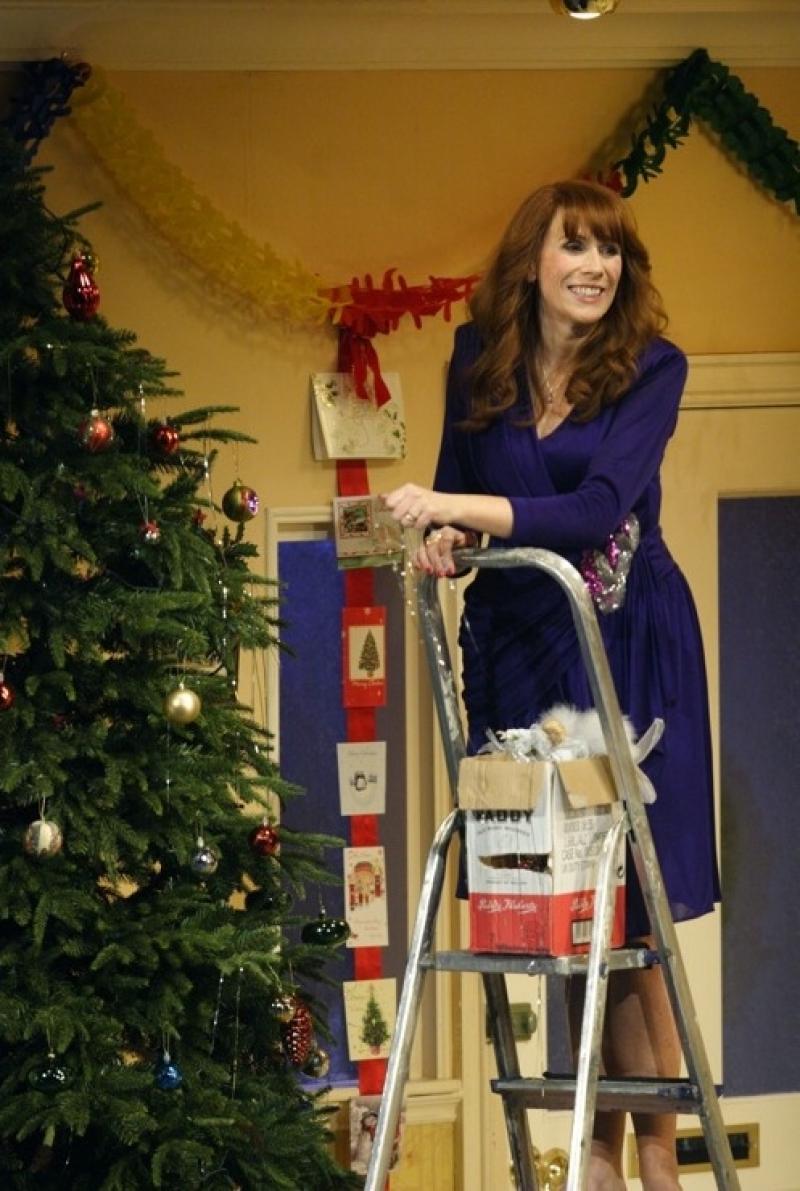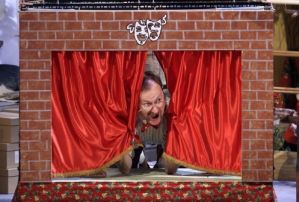Season's Greetings, National Theatre | reviews, news & interviews
Season's Greetings, National Theatre
Season's Greetings, National Theatre
Marianne Elliott's revival of this classic Ayckbourn is a Christmas cracker

Ding dong, merrily on high! Christmas is almost upon us, and those girding themselves for a ghastly family get-together, complete with forced good cheer, paper hats and booze-fuelled bust-ups can see all their worst domestic nightmares enacted in Alan Ayckbourn’s bilious tragi-farce. Painfully funny and piercingly desolate, it’s a side-aching, heartbreaking depiction of loneliness, self-delusion and misery in middle-class suburbia.
It’s the early Eighties, and at the home of Belinda and Neville Bunker (a couple who, in riveting performances by Catherine Tate and Neil Stuke, share an itchy, scratchy marriage that sticks them together and routinely tears them apart like Velcro), friends and relatives gather to share the festivities. Neville’s dipsomaniac sister Phyllis (Jenna Russell) is in the kitchen, woozily cutting herself on every available sharp surface and bleeding all over the Christmas Eve roast lamb dinner. Her ineffectual husband Bernard (a wonderful, poignant Mark Gatiss, hands thrust into his cardigan, his thin frame like a knotted pipe cleaner), is preparing for his annual puppet show, intended to entertain the children, but none too discreetly dreaded by all.
Neville and Phyllis’s bigoted Uncle Harvey (David Troughton), a former security guard who fancies himself something of an SAS commando, has a knife strapped to his shin and has bought toy guns for all the kids. And Eddie (Marc Wootton), Neville’s lifelong mate, has gone AWOL while Katherine Parkinson as his heavily pregnant wife Pattie is left tending to their fractious offspring in a deadened, despairing daze. Throw in Nicola Walker as Belinda’s desperately unhappy sister and Oliver Chris as the handsome young writer she brings along in the hope that tenderness might spark between them – an expectation that quickly founders when he and Belinda lay eyes on each other, and it’s lust at first sight – and the recipe is complete for a Yuletide feast of recriminations and disappointments that will be repeating on them all like acid reflux for years to come.
 Rae Smith’s set, a three-storey cross-section of the Bunker domicile, is raw-edged; we can see the cardboard-like flimsiness of the walls, betraying the worrying fragility of the entire edifice and the marriages it contains. It’s no accident that Bernard’s puppet show is a retelling of the story of The Three Little Pigs; it wouldn’t take a huffing, puffing wolf to blow down this house of straw. The design also brilliantly facilitates the farce, allowing us to watch, horrified, as characters emerge from one room and descend the staircase to enter another, just in time to cop an eyeful of whatever unfortunate and inappropriate incident might be in the process of unfolding there.
Rae Smith’s set, a three-storey cross-section of the Bunker domicile, is raw-edged; we can see the cardboard-like flimsiness of the walls, betraying the worrying fragility of the entire edifice and the marriages it contains. It’s no accident that Bernard’s puppet show is a retelling of the story of The Three Little Pigs; it wouldn’t take a huffing, puffing wolf to blow down this house of straw. The design also brilliantly facilitates the farce, allowing us to watch, horrified, as characters emerge from one room and descend the staircase to enter another, just in time to cop an eyeful of whatever unfortunate and inappropriate incident might be in the process of unfolding there.
And there are plenty of those: bungled sexual congress under the Christmas tree, ugly rows, stumbling, shambling drunkenness that lays bare whole wastelands of unhappy family life. Ayckbourn neatly yet savagely skewers the old canard that “Christmas is for the kiddies”; here, children are often mentioned but never actually seem, and when they are discussed it’s almost always in negative terms. Sweeping up sticky, scattered Dolly Mixture from her carpet, Tate’s Belinda wonders furiously, “Why they can’t put them in their ugly little mouths?” Parkinson’s Pattie, sliding wearily into a chair remarks, defeated and and deadpan, “The thing is, I don’t really want to have this baby, you know?” It’s certainly a hell of a set-up for the infant to be born into. These are relationships built on lies and habit; and in this context, even Uncle Harvey’s paranoid remarks about social apocalypse contain a grain of truth: “It’s all coming apart, you know. The whole fabric, ripping apart like tissue paper.”
But if all that sounds grim, it’s also killingly funny. The cast are terrific, their timing impeccable, and their moments of lucidity agonising. Gatiss’s self-loathing Bernard (pictured above) is especially good, matched by Russell as his slurring liability of a wife, got up in a pointy, tinsel-bedecked hat and a flouncey blue dress like an off-kilter Christmas fairy. And Stuke and Tate brilliantly capture the circuitous war of attrition between two people who have long since ceased to love one another but lack the courage and the energy to break free. It’s no sugarplum of a show, but this is as Christmassy as over-boiled Brussels sprouts: deliciously awful.
Share this article
The future of Arts Journalism
You can stop theartsdesk.com closing!
We urgently need financing to survive. Our fundraising drive has thus far raised £49,000 but we need to reach £100,000 or we will be forced to close. Please contribute here: https://gofund.me/c3f6033d
And if you can forward this information to anyone who might assist, we’d be grateful.

Subscribe to theartsdesk.com
Thank you for continuing to read our work on theartsdesk.com. For unlimited access to every article in its entirety, including our archive of more than 15,000 pieces, we're asking for £5 per month or £40 per year. We feel it's a very good deal, and hope you do too.
To take a subscription now simply click here.
And if you're looking for that extra gift for a friend or family member, why not treat them to a theartsdesk.com gift subscription?
more Theatre
 The Weir, Harold Pinter Theatre review - evasive fantasy, bleak truth and possible community
Three outstanding performances in Conor McPherson’s atmospheric five-hander
The Weir, Harold Pinter Theatre review - evasive fantasy, bleak truth and possible community
Three outstanding performances in Conor McPherson’s atmospheric five-hander
 Dracula, Lyric Hammersmith review - hit-and-miss recasting of the familiar story as feminist diatribe
Morgan Lloyd Malcolm's version puts Mina Harkness centre-stage
Dracula, Lyric Hammersmith review - hit-and-miss recasting of the familiar story as feminist diatribe
Morgan Lloyd Malcolm's version puts Mina Harkness centre-stage
 The Code, Southwark Playhouse Elephant review - superbly cast, resonant play about the price of fame in Hollywood
Tracie Bennett is outstanding as a ribald, riotous Tallulah Bankhead
The Code, Southwark Playhouse Elephant review - superbly cast, resonant play about the price of fame in Hollywood
Tracie Bennett is outstanding as a ribald, riotous Tallulah Bankhead
 Reunion, Kiln Theatre review - a stormy night in every sense
Beautifully acted, but desperately grim drama
Reunion, Kiln Theatre review - a stormy night in every sense
Beautifully acted, but desperately grim drama
 The Lady from the Sea, Bridge Theatre review - flashes of brilliance
Simon Stone refashions Ibsen in his own high-octane image
The Lady from the Sea, Bridge Theatre review - flashes of brilliance
Simon Stone refashions Ibsen in his own high-octane image
 Romans: A Novel, Almeida Theatre review - a uniquely extraordinary work
Alice Birch’s wildly epic family drama is both mind-blowing and exasperating
Romans: A Novel, Almeida Theatre review - a uniquely extraordinary work
Alice Birch’s wildly epic family drama is both mind-blowing and exasperating
 The Producers, Garrick Theatre review - Ve haf vays of making you laugh
You probably know what's coming, but it's such great fun!
The Producers, Garrick Theatre review - Ve haf vays of making you laugh
You probably know what's coming, but it's such great fun!
 Not Your Superwoman, Bush Theatre review - powerful tribute to the plight and perseverance of Black women
Golda Rosheuvel and Letitia Wright excel in a super new play
Not Your Superwoman, Bush Theatre review - powerful tribute to the plight and perseverance of Black women
Golda Rosheuvel and Letitia Wright excel in a super new play
 Cow | Deer, Royal Court review - paradox-rich account of non-human life
Experimental work about nature led by Katie Mitchell is both extraordinary and banal
Cow | Deer, Royal Court review - paradox-rich account of non-human life
Experimental work about nature led by Katie Mitchell is both extraordinary and banal
 Deaf Republic, Royal Court review - beautiful images, shame about the words
Staging of Ukrainian-American Ilya Kaminsky’s anti-war poems is too meta-theatrical
Deaf Republic, Royal Court review - beautiful images, shame about the words
Staging of Ukrainian-American Ilya Kaminsky’s anti-war poems is too meta-theatrical
 Laura Benanti: Nobody Cares, Underbelly Boulevard Soho review - Tony winner makes charming, cheeky London debut
Broadway's acclaimed Cinderella, Louise, and Amalia reaches Soho for a welcome one-night stand
Laura Benanti: Nobody Cares, Underbelly Boulevard Soho review - Tony winner makes charming, cheeky London debut
Broadway's acclaimed Cinderella, Louise, and Amalia reaches Soho for a welcome one-night stand
 The Pitchfork Disney, King's Head Theatre review - blazing with dark energy
Thrilling revival of Philip Ridley’s cult classic confirms its legendary status
The Pitchfork Disney, King's Head Theatre review - blazing with dark energy
Thrilling revival of Philip Ridley’s cult classic confirms its legendary status

Add comment